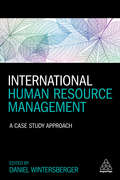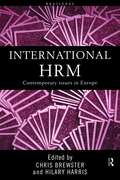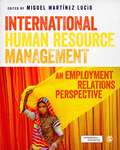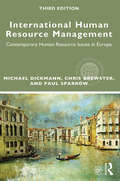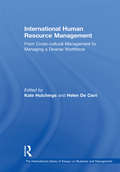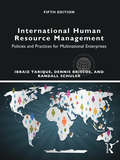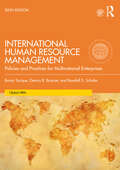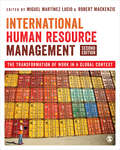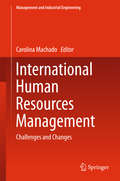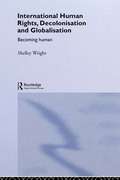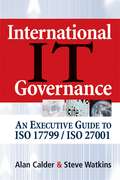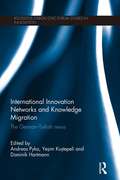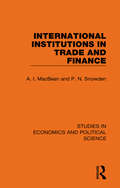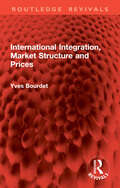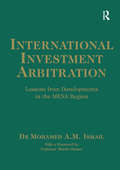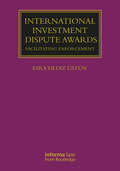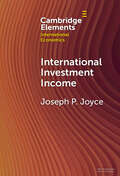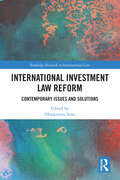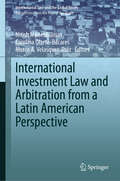- Table View
- List View
International Human Resource Management in South Korean Multinational Enterprises
by Haiying Kang Jie ShenIn this book, Korean multinational enterprises management strategies in China are analyzed. China is re centering Asia around its newfound economic might, even as neighboring countries such as Japan and Korea will remain more economically developed for generations to come. How do Asian companies adapt to the Chinese market? In this fascinating study, Haiying Kang and Jie Shen investigate how Korean enterprises have adapted human resources practices to the evolving corporate climate in China. Unorthodox blends of culture, legal expectations, and more make the market a truly interesting one to explore HRM practices on the margins. Compelling for academics in HRM but also related social sciences, HR practitioners, and corporate leaders alike, this book is a timely look at new Asian corporate cultures.
International Human Resource Management: A Case Study Approach
by Daniel WintersbergerIn the face of globalization, multinational companies have become the norm, rather than the exception. HR professionals now need to manage across borders, cultures and time zones, meaning that a complete understanding of the theory and practice of International Human Resource Management (HRM) is essential. International Human Resource Management is a concise introduction for all students studying International HRM at the Masters level. It covers everything from the cultural and institutional contexts, international employment law and the role of International Framework Agreements to recruitment and selection, training and development, performance management, reward and benefits, job design and other functional areas of International HRM.With numerous industry examples and global case studies from companies such as Telefonica, Unilever and Volkswagen, International Human Resource Management goes beyond the theory to fully explore how International HRM works in practice. It is an indispensable textbook to prepare students for successful careers in human resources. Online supporting resources include additional case studies, lecture slides for every chapter, self-test exercises for students, discussion questions and further reading.
International Human Resource Management: A European Perspective
by Hilary HarrisInternational HRM provides an important contribution to our understanding of the human resource management phenomenon, encompassing groundbreaking research, both empirical and conceptual, on international policy and practice in this rapidly developing area. Set within the context of Europe, this book brings together a collection of thought-provoking papers from European experts in the field, adopting a broad and highly up-to-date approach to topical issues in international HRM. Drawing on national experiences from a wide range of countries, contributors from Europe examine key issues and debates such as: the internationalization of the world economy, the increasing importance of IHRM, and its implications for individuals, organizations and researchers the divergence/convergence of IHRM policies and practices the balance between localization and standardization the dynamics of culture and gender in relation to IHRM This book constitutes a valuable resource for researchers, teachers and students in the field of international human resource management.
International Human Resource Management: An Employment Relations Perspective
by Miguel Martínez LucioAn innovative and thought-provoking resource designed to support the study of International and Human Resource Management and Employment Relations.<P><P> Written by an internationally renowned team of experts and underpinned by cutting-edge research, International Human Resource Management tackles a broad range of controversial and often marginalised issues associated with globalisation and its impact on multinational companies and employees.<P> Prepare to be gripped by fascinating and sometimes shocking revelations about the darker realities of a more globalised context and to emerge fully aware of these issues in the workplace and in employment generally.<P> A truly global range of case studies and examples within the book plus carefully selected journal articles online will further enhance your learning experience and outcomes.<P> Visit the companion website at www.sagepub.co.uk/martinez-lucio for PowerPoint slides, additional case studies, online journal articles and web links related to topics covered in the book.
International Human Resource Management: Contemporary HR Issues in Europe (Global HRM)
by Michael Dickmann, Chris Brewster and Paul SparrowInternational Human Resource Management provides a concise overview of the rich HR landscape in Europe to help students develop cutting-edge people management approaches. The innovative, multi-disciplinary approach of the book provides a holistic picture of the key issues on the individual, organizational and societal levels. The book is divided into three parts: Part I explores the institutional and economic contexts that organizations face in different European countries. This section goes beyond exploring issues of diversity to include a discussion of the impact of the recent financial crisis. Part II concentrates on the key challenges and trends facing HR, including an aging population, migration, and sustainability, and analyzes the unique and inventive ways these are addressed in different countries across Europe. Part III focuses on the fundamental HR areas – recruitment and selection, performance management and rewards, employment relations, global careers, and so forth – and the ways in which these policies and practices are shaped by the European Union. With broader coverage, the latest thinking in the field, and cutting-edge cases, examples and insights, this book will prove a highly valuable resource for students, researchers and practitioners working in human resource management, and international business.
International Human Resource Management: From Cross-cultural Management to Managing a Diverse Workforce (The International Library of Essays on Business and Management)
by Helen De CieriSince the late 1970s scholars and practitioners of international management have paid increasing attention to the impact of globalisation on the management of human resources across national boundaries. This collection of important articles and essays provides a comprehensive review and critique of developments and future directions in International Human Resource Management. Focusing on three major developments or approaches - Cross-Cultural Management, Comparative HRM and Strategic HRM, the volume explores challenges and opportunities facing researchers, international managers and employees.
International Human Resource Management: Policies and Practices for Multinational Enterprises
by Ibraiz Tarique Randall S Schuler Dennis R. BriscoeThoroughly updated and expanded, the fifth edition of International Human Resource Management focuses on international human resource management (IHRM) within multinational enterprises (MNEs). The book has been designed to lead readers through all of the key topics of IHRM in a highly engaging and approachable way. In addition to the key topics and rich pedagogy students have come to expect, chapters have been updated, including an expanded chapter on Comparative and National Culture. Uncovering precisely why IHRM is important for success in international business, and how IHRM policies and practices function within the multinational enterprise, this comprehensive textbook provides an outstanding foundation for understanding the theory and practice of IHRM. It is essential reading for all students, instructors, and IHRM professionals. Instructor resources can be found at http://routledgetextbooks.com/textbooks/_author/globalhrm/
International Human Resource Management: Policies and Practices for Multinational Enterprises (Global HRM)
by Ibraiz Tarique Dennis R. Briscoe Randall S. SchulerThe updated sixth edition of International Human Resource Management is an authoritative resource that focuses on international human resource management (IHRM) within multinational enterprises (MNEs). The book includes fifteen chapters with rich pedagogy students have come to expect and is organized into four sections: Strategic Context National and Cultural Context Global Talent Management Role and the Future of IHRM Each chapter has been designed to lead readers through key topics in a highly engaging and approachable way with learning goals, relevant data, exhibits, figures, vignettes, end-of-chapter case studies, discussion questions, up-to-date content, and numerous references. The sixth edition includes discussions on evolving IHRM topics such as international experiences and adult third culture kids, expanded analyses on health and safety statistics and global workforce analytics, as well as updated and revised illustrations, cases, references, and instructor resources. Uncovering precisely why IHRM is essential for success in international business and how IHRM policies and practices function within the multinational enterprise, this comprehensive textbook provides an excellent foundation for understanding the theory and practice of IHRM. It is essential reading for all students, instructors, and IHRM professionals.
International Human Resource Management: The Transformation of Work in a Global Context
by Miguel Martinez Lucio Robert MacKenzieWritten by an internationally renowned team of experts and underpinned by cutting-edge research, International Human Resource Management tackles a broad range of controversial and often marginalised issues associated with globalisation and its impact on multinational companies and employees. Updated throughout with brand-new case studies, reflective questions and recommended reading, the second edition includes coverage of: • International assignments and worker mobility • The development of new technology and its impact on work • International HRM and the platform economy • The nature of organisational change • The role of sustainability and social responsibility within the firm This innovative and thought-provoking textbook is suitable for students of International Human Resource Management and Employment Relations. Lecturers can visit study.sagepub.com/martinezluciomackenzie to access PowerPoint slides and additional case study material. Miguel Martínez Lucio is a Professor at the University of Manchester (Alliance Manchester Business School), UK. Robert MacKenzie is Professor of Working Life Science at Karlstad Business School, Karlstad University, Sweden.
International Human Resource Management: The Transformation of Work in a Global Context
by Miguel Martinez Lucio Robert MacKenzieWritten by an internationally renowned team of experts and underpinned by cutting-edge research, International Human Resource Management tackles a broad range of controversial and often marginalised issues associated with globalisation and its impact on multinational companies and employees. Updated throughout with brand-new case studies, reflective questions and recommended reading, the second edition includes coverage of: • International assignments and worker mobility • The development of new technology and its impact on work • International HRM and the platform economy • The nature of organisational change • The role of sustainability and social responsibility within the firm This innovative and thought-provoking textbook is suitable for students of International Human Resource Management and Employment Relations. Lecturers can visit study.sagepub.com/martinezluciomackenzie to access PowerPoint slides and additional case study material. Miguel Martínez Lucio is a Professor at the University of Manchester (Alliance Manchester Business School), UK. Robert MacKenzie is Professor of Working Life Science at Karlstad Business School, Karlstad University, Sweden.
International Human Resources Management
by Carolina MachadoThis book covers the issues related to human resource management (HRM) in an international context. It gives perspectives and future direction in International HRM research. The chapters explore the models, tools and processes used by international organizations in order to assist international managers to better face the challenges and changes in HRM. It is suitable to HR managers, engineers, entrepreneurs, practitioners, academics and researchers in the field.
International Human Rights Law
by Olivier De SchutterThis volume offers a systematic overview of the different tools through which the human rights accountability of transnational corporations may be improved. It first examines the responsibility of States in controlling transnational corporations, emphasizing both the limits imposed by the protection of the rights of investors under investment treaties and the potential of the US Alien Tort Claims Act and other similar extra-territorial legislations. It then turns to self-regulation by transnational corporations, through the use of codes of conduct or international framework agreements. It then discusses recent attempts at the global level to improve the human rights accountability of corporations by the direct imposition on corporations of obligations under international law. Finally, it considers the use of public procurement policies or of conditionalities in the lending policies of multilateral lending institutions in order to incentivize TNCs to behave ethically. Altogether, the book offers a rigorous legal analysis of these different developments and critically appraises their potential.
International Human Rights, Decolonisation and Globalisation: Becoming Human (Routledge Studies in International Law)
by Shelley WrightCovering a diverse range of topics, case studies and theories, the author undertakes a critique of the principal assumptions on which the existing international human rights regime has been constructed. She argues that the decolonization of human rights, and the creation of a global community that is conducive to the well-being of all humans, will require a radical restructuring of our ways of thinking, researching and writing. In contributing to this restructuring she brings together feminist and indigenous approaches as well as postmodern and post-colonial scholarship, engaging directly with some of the prevailing orthodoxies, such as 'universality', 'the individual', 'self-determination', 'cultural relativism', 'globalization' and 'civil society'.
International IT governance: an executive guide to ISO 17799/ISO 27001
by Alan Calder Steve WatkinsThe development of IT Governance, which recognizes the convergence between business and IT management, makes it essential for managers at all levels and in organizations of all sizes to understand how best to deal with information security risks. International IT Governance explores new legislation, including the launch of ISO/IEC 27001, which makes a single, global standard of information security best practice available.
International Innovation Networks and Knowledge Migration: The German–Turkish nexus (Routledge/Lisbon Civic Forum Studies in Innovation)
by Andreas Pyka Dominik Hartmann YeMigration is conceived differently in Europe compared with countries like the US, Canada or Australia. International Innovation Networks and Knowledge Migration confronts traditional views on migration with modern theories of brain circulation and innovation networks, showing that migration leads to mutual benefits for both the home and host countries This new volume brings together several case studies and empirical in-depth analyses which are constructed from the strong migration relationship between Turkey and Germany that has existed for more than 50 years. Bringing together over 20 international contributors, this book highlights that knowledge migration and cultural diversity can strongly stimulate entrepreneurial activities, competence acquisition and economic development of countries and regions. The authors highlight the considerable scope for improvement of European migration policies in order to be better prepared to successfully process structural changes stemming from an aging society in Europe, and an increasing international division of labour. This volume is suitable for those who study industrial economics, international economics and European economics. It is also of interest to those who want to delve deeper into the Turkish-German migration nexus.
International Institutions
by David A. Moss Louis T. Wells Jr. Lakshmi GopalanDescribes the IMF, the World Bank Group, the regional development banks, the Bank of International Settlements, the OECD, and the Group of 7.
International Institutions in Trade and Finance (Studies in Economics and Political Science)
by A. I. MacBean P. N. SnowdenOriginally published in 1981, this book provided an up-to-date and critical review of the recent history and current status of the main economic institutions affecting international trade and relations at the time. The authors emphasise the economic effectiveness or otherwise of such bodies as GATT, IMF, EEC, UNCTAD and the World Bank, but take account of the political factors present in both the initial ‘design’ and in the way that the institutions have developed. In particular, the book analyses the changed degree of dominance which the USA had been able to exert on the international community.
International Integration of the Brazilian Economy
by Elias C. GrivoyannisBrazil is the most populous economy in Latin America with the second highest GDP among the emerging BRIC economies, after China, and the second per capita GDP among the BRIC economies after Russia. The objective of this book is to provide a thorough historical, statistical, and institutional description of the factors that affect and are affected by Brazil’s international trade and integration with the world economy. It includes a most recent account of what is presently going on in Brazil and the type of economy from which Brazil is emerging. The authors use Brazil as a case study and explain both the process and the outcome of international economic integration by analyzing in each chapter a different contributing factor to the benefits and costs from Brazil’s economic interdependency with the world economy. This makes the reading of this book extremely valuable. The topics addressed in this book will increase the reader’s awareness of the institutional, economic, and cultural forces that shape the dynamism of Brazil’s international trade and integration with the world economy, and will continue to do so in future years.
International Integration, Market Structure and Prices (Routledge Revivals)
by Yves BourdetOriginally published in 1988, this study focusses on international economic integration in relation to the passenger car industry and market in the West-European car-making countries, Germany, France, Italy, Sweden and the UK in the second half of the 20th Century when the revival of protectionism was a key feature of the international trading system. The book illustrates the interaction between international integration, market structure and firm conduct and the political sphere at the national as well as the supranational level. Unlike previous analyses of international integration, this book concentrates on a single industry over a significant period.
International Investment Arbitration: Lessons from Developments in the MENA Region
by Mohamed A.M. IsmailArbitration is the most common mechanism for disputes' settlement in developing countries. Following the move to free market economies, arbitration will play an increasingly fundamental role in order to protect foreign investors in the Middle East and North African Region (MENA). This book examines the pulse and dynamics of international investment arbitration and the new era of mediation in state contracts in the region. The author explores the harmonization of international arbitration and the sensitive issue of le Contrat Administratif in Middle East civil law countries. The volume also discusses the pivotal role of international organizations such as UNCTAD and ICSID in codifying fair and prompt mechanisms for dispute settlement. Using Latin American countries as a prime example of how international legislative instruments serve international investment law principles and comparing Latin American experiences where appropriate, the book demonstrates how lessons can be learned in respect of alternative dispute resolution, international commercial arbitration and investor-states arbitration. It provides suggestions and recommendations for the future and includes useful appendices detailing recent worldwide trends, regional and international instruments in the arbitration world.
International Investment Dispute Awards: Facilitating Enforcement (Lloyd's Arbitration Law Library)
by Esra Yildiz ÜstünThis book examines how international investment arbitral awards can be facilitated. It sets out to achieve a fuller conceptualisation and theorisation of awards through a discussion of relevant issues and themes, as well as demonstrating how they can be achieved through a comparative approach that has been conceived and developed with reference to existing deficiencies in the research literature. This contribution is particularly important given the worldwide emergence of investment arbitration as a powerful form of alternative dispute resolution (ADR). The book ultimately seeks to explore and develop solutions that can be directed to an existing oversight and deficit within the international investment architecture. In considering the advantages and disadvantages of each ‘solution’, it will work towards an approach best-suited to upholding the interest of the victorious party at the enforcement stage. The enforcement of arbitral awards on a voluntary basis has proven to be insufficient, and this created a real and ongoing shortcoming that needs to be addressed. International Investment Dispute Awards: Facilitating Enforcement therefore seeks to directly influence existing practice on the part of international institutions, with the intention of helping to develop a more effective resolution. The readerships for this book will include arbitration practitioners, policy-makers (including treaty drafters), academics and postgraduate students interested in the enforcement of investment arbitral awards.
International Investment Income (Cambridge Elements in International Economics)
by Joseph P. JoyceInternational investments yield returns in the forms of multinational profits, dividends and interest on equity and debt, and the charges on bank loans. These payments are recorded in the current account of the balance of payments and constitute a significant component of many countries' current accounts. Foreign direct investment- (FDI)-generated income is often channeled by firms through countries with low tax rates and regulations. Emerging markets regularly have large FDI income deficits, but a substantial portion of these payments are reinvested. Portfolio securities provide income from diversified securities and lower risk. Global banking offers financing from foreign sources, which may support stability during periods of domestic crises.
International Investment Law Reform: Contemporary Issues and Solutions (Routledge Research in International Law)
by Obiajunwa AmaThis book offers contemporary assessment of the challenges facing international investment law and proposes innovative solutions for reform.The most controversial issue in international investment law is on the settlement of investor-state disputes and its implications on national regulatory autonomy. This book recognises that current literature in international investment law fails to adequately incorporate diverse perspectives. Therefore, it interrogates the United Nations Sustainable Development Goals and their relationship with international investment policies of developing countries, particularly in Africa where there has been a marked increase in investor-state disputes. Despite existing reform proposals by the UNCITRAL Working Group III, and emerging progressive treaty drafting practices around the world, there remains a need for further clarity on how the world should proceed in reforming and restructuring international investment law and policy. This book contributes to existing body of research knowledge by presenting new evidence and proposing practical solutions to enhancing the regulation of international investments and promotion of sustainable development.It will inform a range of stakeholders including investors, civil society organisations, States, students, and international organisations such as the World Bank.
International Investment Law and Arbitration from a Latin American Perspective (International Law and the Global South)
by Nitish Monebhurrun Carolina Olarte-Bácares Marco A. Velasquez-RuizThe book brings to light how Latin American states have traditionally stood before the field of International Investment Law and Arbitration. It delves into their posture of resistance to critically examine how their perspective has gradually changed and how they have adapted and molded their investment agreements so as not to leave their position as players in the field of International Investment Law. Many Latin American states have appeared as defendants before international investment tribunals and some of these, like Venezuela, Bolivia or Ecuador, have denounced their international investment agreements. Deeming the law field as imbalanced, they have looked for alternatives to continue providing legal protection to foreign investors while protecting their right to regulate in the name of public interest. Some interesting investment agreements models, sometimes of a different ilk, have consequently flourished and have arrested the attention of those studying or working with international investment law.The main objective of this book is to critically discuss how Latin American states have accepted, resisted, or adapted themselves to international investment law and arbitration. Accordingly, the general connection between these states and international investment law are explained in an introduction which examines the general trends as per which Latin American states have offered a legal protection to foreign investments. The first part enters the merits of where international investment law and arbitration stand in some Latin American states whereby the experience of Brazil, Chile, Argentina, Venezuela, and Uruguay are discussed. The following parts explain the trends in international investment law and arbitration in Latin America. These trends are namely related to dispute settlement and governance, to the connection between investment law and human rights and finally to regionalization. In these parts, the experience of states like Brazil,Colombia, Peru, and Mexico are perused.

